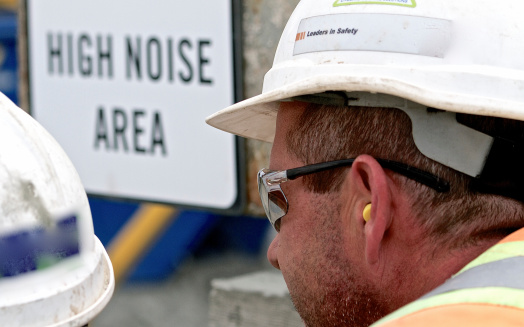Work-Related Hearing Loss Is a Serious Work Injury

A workers’ comp lawyer serving MA & RI explains
Hearing loss injuries sustained on the job can have serious consequences. Once you lose your hearing, you cannot get it back. Whether your hearing loss happens slowly over time or due to a single, sudden event, losing your hearing at work is a serious medical condition that affects millions of workers throughout the country, according to the U.S. Centers for Disease Control and Prevention (CDC), which is promoting National Protect Your Hearing Month this October.
In many cases, people who suffer hearing loss at work are entitled to receive workers’ compensation benefits. But actually getting such financial compensation and other benefits can often be challenging for many different reasons. That’s why it’s important to consult with an experienced workers’ compensation attorney who understands how the legal system works in your specific state.
How common is work-related hearing loss?
Work-related hearing loss injuries are some of the most common work injuries nationwide, according to the CDC. Specifically, hearing loss is the third-most common chronic physical condition among adults nationwide. The two most common physical health problems that affect adults are hypertension and arthritis.
An estimated 12 percent of workers nationwide have difficulty hearing, according to the CDC. This includes 8 percent of workers who have tinnitus (commonly described as a ringing in the ears) and 4 percent of workers who have difficulty hearing and tinnitus.
Among workers who have difficulty hearing, 24 percent sustained their hearing loss due to work-related conditions known as occupational exposure. That’s because millions of workers each year are exposed to dangerously loud noise levels and other hazardous work conditions.
Frequent causes of hearing loss at work
There are two common causes of work-related hearing loss injuries – loud noises and hazardous chemicals. This is why employers should provide workers with hearing protection, including earplugs and protective headphones.
Each year, an estimated 22 million workers nationwide are exposed to hazardous noise levels on the job, according to the CDC. Noise is considered hazardous if it is above 85 decibels or if someone has to raise their voice to speak with someone 3 feet away or less.
As for hazardous chemicals, more than 30 million workers are exposed to chemicals considered harmful to the ear or a person’s hearing. Such chemicals are considered ototoxic or poisonous to the ear. Ototoxic chemicals include:
- Chemical solvents, including styrene, toluene, and trichloroethylene
- Lead, mercury, and other metals and compounds, including organic tin
- Asphyxiants, including hydrogen cyanide and carbon monoxide
- Nitriles, including acrylonitrile and 3-Butenenitrile
- Antineoplastic agents and other pharmaceuticals
Which workers are the most at risk?
Certain professions face a higher risk of sustaining hearing loss at work, including those who work in:
- Construction
- Factories
- Assembly lines
- Airline maintenance
- Sheet metal work
Whatever type of work you perform, if you believe you sustained a loss of hearing while on the job, make sure you take steps right away to protect your health and your rights as an injured worker.
What should I do if I’m suffering from hearing loss due to work?
If you believe your hearing loss injury is work-related, make sure you take the following steps right away:
- Tell your supervisor at work you are experiencing hearing loss and you believe your injury is work-related.
- Seek medical attention right away. Tell the doctor you are having trouble hearing and ask them to examine you and run diagnostic hearing loss tests, including an Auditory Brainstem Response (ABR) test or a Brainstem Auditory Evoked Response (BAER) test. It’s important to have documentation of your work-related hearing loss.
- Ask your doctor for written copies of all medical records related to your hearing loss.
- Talk to a workers’ compensation lawyer as soon as possible.
The sooner you can talk to an attorney, the better you can understand the legal options available to you.
A workers’ comp attorney can fight for the benefits you deserve
Even though hearing loss injuries are among the most common types of workers’ compensation claims, that doesn’t mean you’ll have an easy time getting the benefits you need for your injury. Many employers and insurance companies deny these types of workers’ comp claims, insisting that the hearing loss injury occurred outside of work.
Whatever the circumstances, it’s important to talk to an attorney as soon as possible to learn more about your legal options and to better understand your rights. The experienced workers’ compensation lawyers at the Law Offices of Deborah G. Kohl can help you every step of the way. We have years of experience helping injured workers in Massachusetts and Rhode Island demand the support they deserve. As your attorney, we can investigate your claim and help you apply for workers’ compensation benefits. That way, you can get the support you need and deserve for your hearing loss.
Learn more about how we can help you. Contact us and schedule a free case evaluation with a workers’ compensation attorney who will make sure your concerns are heard loud and clear. We have three offices conveniently located in Rhode Island and Massachusetts and handle workers’ compensation claims in both states.
